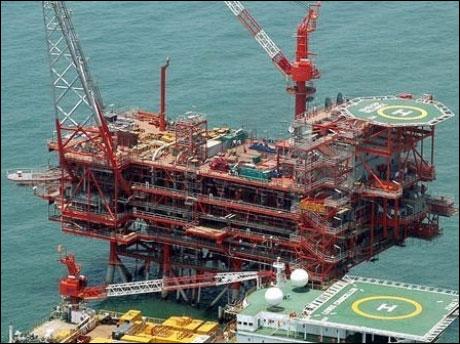 | « Back to article | Print this article |
Indian oil firms focus on production in fight for foreign assets
Faced with soaring demand, stagnant output at home and a need to diversify from Iranian crude imports lost to Western sanctions, Indian oil companies are hungry for deals like ONGC's Kashagan buy that promise supplies sooner rather than later.
State-run ONGC Videsh has agreed to pay about $5 billion for 8.4 percent of the Kashagan field in Kazakhstan, the world's largest oilfield discovery in four decades - which could boost its output by about 16 per cent within a year.
The deal adds to a stable of assets that span some of the trickiest territories in the world - Sudan, Iran, Iraq, Syria and Libya among them - accumulated as parent Oil and Natural Gas Corporation (ONGC) struggled with domestic output.
But it's a drop in the ocean for the world's fourth-biggest crude importer - it buys in 3.5 million barrels per day (bpd) - where the energy gap triggers constant power cuts. Asia's third-largest economy plans to hit 8 percent growth in 2014/15 and by 2030 that could lift it to be third-largest in the world and also the No. 3 energy consumer, according to BP.
Oil supplies have become more urgent as Western sanctions over nuclear projects squeeze Iran, once India's second-biggest supplier. India's imports from Tehran slipped by nearly a fifth to 257,000 bpd in April-September.
"Our priority is to look for discovered, developed and producing assets which give us production growth immediately," T.K. Anantha Kumar, head of finance for Oil India, the country's other state-run explorer, told Reuters.
While not all the oil bought overseas turns up in domestic refineries, it can give companies a stake in the global crude trade, enhancing their flexibility for supplies and potentially helping profits.
ONGC Videsh said in its 2011/12 annual report that its tough production targets - 20 million tonnes of oil equivalent by 2017/18 and 60 million tonnes by 2029/30 - mean it "needs to concentrate on acquiring assets in (the) development and production phase initially" before looking at exploration acreage.
Parent ONGC does not have a good track record in exploration and was slated this year by the state auditor for focusing too much on producing fields at home.
"Definitely we are looking at a good mix of producing as well as exploration assets because we want to increase our contribution" to India's energy security, an ONGC Videsh official told Reuters on condition of anonymity.
Click on NEXT for more...
Indian oil firms focus on production in fight for foreign assets
Acquisitive Asia
Indian companies will face sharp competition for these assets, however, from Asian rivals Japan and China - also major clients of Iran and facing their own demand challenges, the former because of nuclear power plant closures.
With all but two of Japan's reactors idled and the government set on reducing reliance on atomic power after the Fukushima disaster, Japan's energy explorers are on a quest for upstream assets overseas, often with strong state support.
Should ONGC complete the purchase of the Kashagan stake - ConocoPhillips' existing partners in the project have a right of first refusal on it - it could be working alongside Japan's biggest energy explorer, Inpex Corp, which has a 7.56 per cent share.
Chinese state oil companies CNOOC, Sinopec Group, the parent of Sinopec Corp, and PetroChina have been among the world's most acquisitive oil firms in recent years. CNOOC has bid $15.1 billion for Canadian oil and gas producer Nexen, while Sinopec recently paid $1.5 billion for UK North Sea assets and $2.5 billion for a one-fifth stake in a Nigerian offshore field.
Asian companies may be willing to buy into countries where the political situation deters Western buyers - reflected in the spread of their portfolios. The Kashagan field has been plagued by disputes with the Kazakh government and cost overruns.
"In some cases, the political context can inhibit international oil companies from investing in a country where Chinese and other Asian companies have jumped in," said Siddik Bakir, Middle East and South Asia energy analyst at IHS World Markets Energy in London, in an email.
Chinese companies, which have also suffered in Sudan and Syria, are interested in investing in Myanmar and have often leveraged government-to-government deals with developing or politically risky countries where international majors can't or don't bother to go.
More recently, both Chinese and Indian companies have turned their attention to OECD countries such as Canada and the United States, while maintaining their interest in the rich prospects of Latin America and Africa. ONGC Videsh, for example, is focusing on Africa and Latin America, its managing director, D.K. Sarraf, said, after a policy shift last year away from politically risky regions. Oil India is focused on North America and Africa.
Click on NEXT for more...
Indian oil firms focus on production in fight for foreign assets
Big cheques
And while the search for fundamental energy supplies such as oil, natural gas and coal continues, new sources such as oil sands or shale deposits are taking centre stage.
Chinese companies have struck multi-billion dollar deals for such assets in the United States, and an Indian consortium - including ONGC and Oil India - is in the running for oil sands properties in Canada.
ONGC Videsh "will need to be prepared to face more international competition on a regional and global level, particularly from Chinese companies," Bakir said.
"Indian state-run companies don't have a good track record of competing and winning against Chinese companies in a bidding scenario, especially when you have to write a cheque for more than $5 billion," said a resources banker with a European bank in Mumbai. "In those cases, Chinese companies will continue to have an upper hand."
ONGC Videsh reckons it needs $20 billion to buy the assets it needs up to 2030, while Oil India is looking to invest up to $1.82 billion for assets that could give it an extra 1.5-1.75 million tonnes a year of oil.
But unlike Chinese companies which enjoy financial independence, India's state-owned energy companies have not been very successful in closing big overseas acquisitions, often because of delays in securing government approvals at home.
They may be sitting on huge piles of cash, but New Delhi is in no mood to throw money around at the moment with a fiscal deficit big enough to threaten an expensive credit downgrade.

© Copyright 2025 Reuters Limited. All rights reserved. Republication or redistribution of Reuters content, including by framing or similar means, is expressly prohibited without the prior written consent of Reuters. Reuters shall not be liable for any errors or delays in the content, or for any actions taken in reliance thereon.


